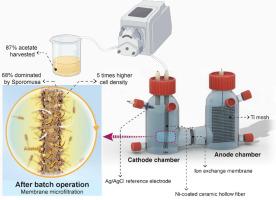Chemical Engineering Journal ( IF 13.3 ) Pub Date : 2022-07-22 , DOI: 10.1016/j.cej.2022.138230 Bin Bian , Yogesh Singh , Korneel Rabaey , Pascal E. Saikaly

|
Microbial electrosynthesis (MES) explores the potential of chemolithoautotrophs for the production of value-added products from CO2. However, the enrichment of chemolithoautotrophs on a cathode is relatively slow and the separation of the products is energy intensive. In this study, a novel and multifunctional cathode configuration, enabling the simultaneous enrichment of chemolithoautotrophs and separation of acetate from MES, was developed through one-step electroless nickel plating on ceramic hollow fiber (CHF) membrane. A thick layer of chemolithoautotrophs with 5.2 times higher cell density, which was dominated by Sporomusa (68% of the total sequence reads in biocathode), was enriched on the membrane cathode surface through suspended biomass microfiltration compared to MES reactors operated without filtration. Simultaneously, more than 87% of acetate (31 mM) per batch could be harvested after catholyte microfiltration. The Ni content was >80% on the CHF surface after long-term operation in the two-chamber MES system, which exhibited 78% lower charge transfer resistance compared to three-chamber MES system (∼110 vs 510 ohms) for acetate separation/extraction. The ease of product separation in two-chamber MES systems and the fast establishment of chemolithoautotrophs on the cathode is a step forward in realizing MES systems as a promising platform for CO2 reduction and biochemical production in a circular carbon bioeconomy.
中文翻译:

镀镍陶瓷中空纤维阴极用于快速富集化能自养生物并有效减少微生物电合成中的 CO2
微生物电合成 (MES) 探索化能自养生物从 CO 2生产增值产品的潜力。然而,化能自养生物在阴极上的富集相对较慢,并且产物的分离是能量密集型的。在这项研究中,通过在陶瓷中空纤维 (CHF) 膜上一步化学镀镍,开发了一种新颖的多功能阴极配置,能够同时富集化能自养生物和从 MES 中分离乙酸盐。一层厚厚的化学自养生物,细胞密度高出 5.2 倍,以孢子菌为主与没有过滤运行的 MES 反应器相比,(生物阴极中总序列读数的 68%)通过悬浮生物质微滤在膜阴极表面富集。同时,在阴极电解液微滤后,每批可收获超过 87% 的乙酸盐 (31 mM)。在两室 MES 系统中长期运行后,CHF 表面的 Ni 含量 > 80%,与三室 MES 系统(~110 vs 510 ohms)相比,其电荷转移电阻降低了 78%,用于醋酸盐分离/萃取。在两室 MES 系统中产品分离的简易性和在阴极上快速建立化能自养生物是在实现 MES 系统作为循环碳生物经济中 CO 2减少和生化生产的有前景的平台方面向前迈出的一步。































 京公网安备 11010802027423号
京公网安备 11010802027423号